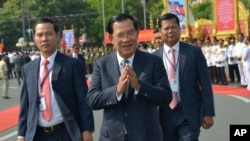Cambodian Prime Minister Hun Sen has responded positively to a letter from U.S. President Donald Trump that encouraged him to promote democracy and improve strained relations between the two countries.
A letter from Hun Sen, dated Tuesday and shared online Wednesday by members of his government, accepted Trump's invitation to a meeting of Southeast Asian leaders in the United States early next year, as well as an offer for the two countries' foreign policy teams to hold talks.
Washington has long criticized Hun Sen's government for its poor record on democratic and human rights. Hun Sen, in power for 34 years, has accused the U.S. of seeking "regime change" to oust him.
Trump's Nov. 1 letter assured Hun Sen that the U.S. does not seek regime change. The president counseled Hun Sen to "put Cambodia back on the path of democratic governance."
"I am reassured by your explicit statement whereby you seek genuine engagement to pursue democracy, individual liberty and the rule of law rather than through regime change," Hun Sen wrote.
Hun Sen has a reputation as an authoritarian leader and has said he intends to serve until 2028. He has been quick to crack down on any opponents, accusing them of seeking a ``color revolution'' of the sort that upended established regimes in Eastern and Central Europe and the Middle East.
There are some signs he seeks to polish up his image, including the recent release from detention of members of the opposition.
He faces external political pressure that ballooned after last July's general election, in which his Cambodian People's Party won all 125 National Assembly seats. The European Union and others charged that the election was unfair and unfree because the sole credible opposition party, the Cambodia National Rescue Party, was dissolved in November 2017 by Cambodia's Supreme Court.
The EU is now considering whether to end duty-free and quota-free imports from Cambodia because of concerns about its poor record in human and labor rights. A cutoff could badly hurt Cambodia's economy, especially the clothing and footwear industry that is the country's top export sector, employing nearly 800,000 people in about 1,000 garment and shoe factories. In 2018, the Southeast Asian country shipped nearly $10 billion worth of products to the United States and Europe.
Trump's letter recounted positive elements of the U.S. Cambodian relationship in the past, while acknowledging ``difficulties`` in recent years.
"With regards to the bilateral relations between our two countries, I concur with you that they have gone through periods of ups and downs," Hun Sen wrote. "However, I am of the view that we should not become hostage of a few dark chapters of our own history."
He said contemporary Cambodia owes its prosperity in part to "the contribution of the American people and government from the peaceful democratization, to the nation building, social governance, and the generous market access."
Hun Sen has rarely had such warm words for the United States in recent years as Cambodia has leaned toward China, which has become its major political and economic backer, and with which it also has increasingly close military links. A late 2017 crackdown on the media and political foes saw an opposition leader arrested for alleged treason because he had taken part in




